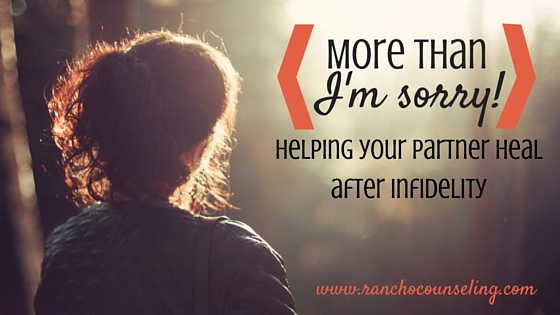More than I'm sorry: Helping your partner heal after infidelity
Infidelity can rock your relationship to the core. It brings out so many things and what’s amazing is that some of those things have the ability to make it stronger. After infidelity, many couples who decide to stay together find themselves talking more, sharing their needs more, and making their feelings and emotions known like never before.
As I’ve talked about before, when there has been infidelity and it’s been decided by the couple that they want to start the healing process, each partner needs to play a role in this. It isn't just the partner who has strayed's responsibility to repair the relationship but he or she does play a major role.
One of my favorite clinicians in the field of psychology and couples therapy is Esther Perel, and she talks about a very important concept in overcoming infidelity, and it is that if you have been unfaithful to your partner but would like to do the work to keep the relationship together, you must hold vigil for your relationship. What does this mean?
Holding vigil means that it is now your responsibility to not only acknowledge the hurt and pain that's been caused by your actions, but also acknowledge triggers for your partner before they happen. Through the healing process and especially if you've been working with a therapist to help get through this difficult time in your relationship, you'll come to understand places and things that trigger your partner to recall your affair.
Triggers are powerful and have the ability to bring an injured partner to their knees, causing them to revert back to square one, and cause all the pain of discovering the affair to come rushing back to them. Triggers can be so many things that just remind an injured partner of the event and of the pain they've felt since.
Holding vigil means that you take the time to bring those triggers up in anticipation of them happening, when it is appropriate. For example, if you know that your partner will be triggered by a certain event like being in a specific place because you had an encounter with the other person there, rather than just preparing yourself for the repercussions of their emotions you need to take action.
If you know that your partner is triggered by you going out of town for work because an affair occurred when you were traveling, as a work trip approaches it is then your responsibility to bring up the trip and acknowledge that you understand how this trip will make your partner feel. Be the one to broach the subject, be the one to reflect the hurt feelings, and be the one to say that you are there to hear about those feelings, and be the one to implement important changes during this trip to create a sense of security for your partner. Will you check in more frequently by phone, Skype, or text? Will you be sharing a room with a work colleague? Will you avoid the bar and drinks after dinner? What will you do instead?
Taking the time and energy to acknowledge your partner’s triggers and emotions, and creating a plan for security will help immensely in the healing process. This isn’t about beating yourself up, or being an emotional punching bag, but it is about taking an extra step to show your partner that you understand their feelings, and that you are there with them working through these difficulties with them.
I’ve had clients who have been injured by an affair tell me how elated they are when their partners do this. They describe it as a feeling of being understood, of being appreciated, and they say it is a relief because they were not the ones who had to bring it up.
They often feel relieved at not having to always ruin a perfectly nice evening with their partner by dredging up their emotions about an upcoming event that may trigger them. They feel understood when their partners acknowledge that a song or a movie makes them feel a flood of negative emotions even before they get that look on their faces. That acknowledgement is powerful and leads to connection and healing.
If you are having trouble holding vigil in your relationship after an affair, consulting a therapist can be an excellent path towards healing. I’d love to hear from you and point you in the right direction, and you may reach me at (909) 226-6124 for a free consultation.

